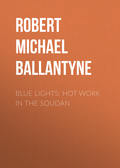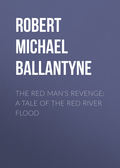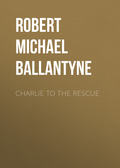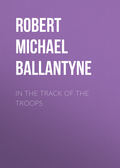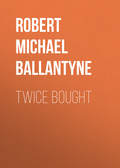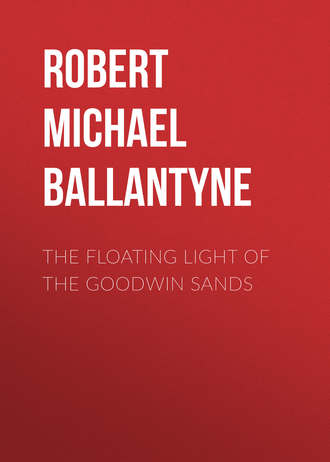
Robert Michael Ballantyne
The Floating Light of the Goodwin Sands
“If he is,” said Jones, with an equally stern glance at the mate, “he is the only loser—at all events the chief one—by his fondness.”
“You’re right,” retorted Mr Welton sharply; “the loss of a kit may be replaced, but there are some things which cannot be replaced when lost. However, you know your own affairs best. Come below, friends, and have something to eat and drink.”
After the wrecked party had been hospitably entertained in the cabin with biscuit and tea, they returned to the deck, and, breaking up into small parties, walked about or leaned over the bulwarks in earnest conversation. Jack Shales and Jerry MacGowl took possession of Jim Welton, and, hurrying him forward to the windlass, made him there undergo a severe examination and cross-questioning as to how the sloop Nora had met with her disaster. These were soon joined by Billy Towler, to whom the gay manner of Shales and the rich brogue of MacGowl were irresistibly attractive.
Jim, however, proved to be much more reticent than his friends deemed either necessary or agreeable. After a prolonged process of pumping, to which he submitted with much good humour and an apparent readiness to be pumped quite dry, Jerry MacGowl exclaimed—
“Och, it ain’t of no use trying to git no daiper. Sure we’ve sounded ’im to the bottom, an’ found nothin’ at all but mud.”
“Ay, he’s about as incomprehensible as that famous poet you’re for ever givin’ us screeds of. What’s ’is name—somebody’s son?”
“Tenny’s son, av coorse,” replied Jerry; “but he ain’t incomprehensible, Jack; he’s only too daip for a man of or’nary intellick. His thoughts is so awful profound sometimes that the longest deep-sea lead line as ever was spun can’t reach the bottom of ’em. It’s only such oncommon philosophers as Dick Moy there, or a boardin’-school miss (for extremes meet, you know, Jack), that can rightly make him out.”
“Wot’s that you’re sayin’ about Dick Moy?” inquired that worthy, who had just joined the group at the windlass.
“He said you was a philosopher,” answered Shales. “You’re another,” growled Dick, bluntly, to MacGowl.
“Faix, that’s true,” replied Jerry; “there’s two philosophers aboord of this here light, an’ the luminous power of our united intellicks is so strong that I’ve had it in my mind more than wance to suggest that if they wos to hoist you and me to the masthead together, the Gull would git on first-rate without any lantern at all.”
“Not a bad notion that,” said Jack Shales. “I’ll mention it to the superintendent to-morrow, when the tender comes alongside. P’raps he’ll report you to the Trinity House as being willin’ to serve in that way without pay, for the sake of economy.”
“No, not for economy, mate,” objected Dick Moy. “We can’t afford to do dooty as lights without increased pay. Just think of the intellektooal force required for to keep the lights agoin’ night after night.”
“Ay, and the amount of the doctor’s bill,” broke in MacGowl, “for curin’ the extra cowlds caught at the mast-head in thick weather.”
“But we wouldn’t go up in thick weather, stoopid,” said Moy,—“wot ud be the use? Ain’t the gong enough at sich times?”
“Och, to be sure. Didn’t I misremember that? What a thing it is to be ready-witted, now! And since we are makin’ sich radical changes in the floating-light system, what would ye say, boys, to advise the Boord to use the head of Jack Shales instead of a gong? It would sound splendiferous, for there ain’t no more in it than an empty cask. The last gong they sint us down was cracked, you know, so I fancy that’s considered the right sort; and if so, Jack’s head is cracked enough in all conscience.”
“I suppose, Jerry,” said Shales, “if my head was appointed gong, you’d like that your fist should git the situation of drumstick.”
“Stop your chaffin’, boys, and let’s catch some birds for to-morrow’s dinner,” said one of the men who had been listening to the conversation. “There’s an uncommon lot of ’em about to-night, an’ it seems to me if the fog increases we shall have more of ’em.”
“Ho–o–o!
“‘Sich a gittin’ up stairs, and
A playin’ on the fiddle,’”
Sang Jack Shales, as he sprang up the wire-rope ladder that led to the lantern, round which innumerable small birds were flitting, as if desirous of launching themselves bodily into the bright light.
“What is that fellow about?” inquired Stanley Hall of the mate, as the two stood conversing near the binnacle.
“He’s catching small birds, sir. We often get a number in that way here. But they ain’t so numerous about the Gull as I’ve seen them in some of the other lightships. You may find it difficult to believe, but I do assure you, sir, that I have caught as many as five hundred birds with my own hand in the course of two hours.”
“Indeed! what sort of birds?”
“Larks and starlings chiefly, but there were other kinds amongst ’em. Why, sir, they flew about my head and round the lantern like clouds of snowflakes. I was sittin’ on the lantern just as Shales is sittin’ now, and the birds came so thick that I had to pull my sou’-wester down over my eyes, and hold up my hands sometimes before my face to protect myself, for they hit me all over. I snapped at ’em, and caught ’em as fast as I could use my hands—gave their heads a screw, and crammed ’em into my pockets. In a short time the pockets were all as full as they could hold—coat, vest, and trousers. I had to do it so fast that many of ’em wasn’t properly killed, and some came alive agin, hopped out of my pockets, and flew away.”
At that moment there arose a laugh from the men as they watched their comrade, who happened to be performing a feat somewhat similar to that just described by the mate.
Jack Shales had seated himself on the roof of the lantern. This roof being opaque, he and the mast, which rose above him, and its distinctive ball on the top, were enveloped in darkness. Jack appeared like a man of ebony pictured against the dark sky. His form and motions could therefore be distinctly seen, although his features were invisible. He appeared to be engaged in resisting an attack from a host of little birds which seemed to have made up their minds to unite their powers for his destruction; the fact being that the poor things, fascinated by the brilliant light, flew over, under, and round it, with eyes so dazzled that they did not observe the man until almost too late to sheer off and avoid him. Indeed, many of them failed in this attempt, and flew right against his head, or into his bosom. These he caught, killed, and pocketed, as fast as possible, until his pockets were full, when he descended to empty them.
“Hallo! Jack, mind your eye,” cried Dick Moy, as his friend set foot on the deck, “there’s one of ’em agoin’ off with that crooked sixpence you’re so fond of.”
Jack caught a starling which was in the act of wriggling out of his coat pocket, and gave it a final twist.
“Hold your hats, boys,” he cried, hauling forth the game. “Talk of a Scotch moor—there’s nothin’ equal to the top of the Gull lantern for real sport!”
“I say, Jack,” cried Mr Welton, who, with Stanley and the others, had crowded round the successful sportsman, “there are some strange birds on the ball. Gulls or crows, or owls. If you look sharp and get inside, you may perhaps catch them by the legs.”
Billy Towler heard this remark, and, looking up, saw the two birds referred to, one seated on the ball at the mast-head, the other at that moment sailing round it. Now it must be told, and the reader will easily believe it, that during all this scene Billy had looked on not only with intense interest, but with a wildness of excitement peculiar to himself, while his eyes flashed, and his small hands tingled with a desire to have, not merely a finger, but, all his ten fingers, in the pie. Being only a visitor, however, and ignorant of everybody and everything connected with a floating light, he had modestly held his tongue and kept in the background. But he could no longer withstand the temptation to act. Without uttering a word, he leaped upon the rope-ladder of the lantern, and was half way up it before any one observed him, determined to forestall Jack Shales. Then there was a shouting of “Hallo! what is that scamp up to?” “Come down, you monkey!” “He’ll break his neck!” “Serve him right!” “Hi! come down, will ’ee?” and similar urgent as well as complimentary expressions, to all of which Billy turned a deaf ear. Another minute and he stood on the roof of the lantern, looking up at the ball and grasping the mast, which rose—a bare pole—twelve or fifteen feet above him.
“Och! av the spalpeen tries that,” exclaimed Jerry MacGowl, “it’ll be the ind of ’im intirely.”
Billy Towler did try it. Many a London lamp-post had he shinned up in his day. The difference did not seem to him very great. The ball, he observed, was made of light bands or lathes arranged somewhat in the form of lattice-work. It was full six feet in diameter, and had an opening in the under part by which a man could enter it. Through the lozenge-shaped openings he could see two enormous ravens perched on the top. Pausing merely for a second or two to note these facts and recover breath, he shinned up the bare pole like a monkey, and got inside the ball.
The spectators on deck stood in breathless suspense and anxiety, unable apparently to move; but when they saw Billy clamber up the side of the ball like a mouse in a wire cage, put forth his hand, seize one of the ravens by a leg and drag it through the bars to him, a ringing cheer broke forth, which was mingled with shouts of uncontrollable laughter.
The operation of drawing the ill-omened bird through the somewhat narrow opening against the feathers, had the double effect of ruffling it out to a round and ragged shape, very much beyond its ordinary size, and of rousing its spirit to ten times its wonted ferocity, insomuch that, when once fairly inside, it attacked its captor with claw, beak, and wing furiously. It had to do battle, however, with an infant Hercules. Billy held on tight to its leg, and managed to restrain its head and wings with one arm, while with the other he embraced the mast and slid down to the lantern; but not before the raven freed its head and one of its wings, and renewed its violent resistance.
On the lantern he paused for a moment to make the captive more secure, and then let his legs drop over the edge of the lantern, intending to get on the rounds of the ladder, but his foot missed the first one. In his effort to regain it he slipped. At that instant the bird freed his head, and with a triumphant “caw!” gave Billy an awful peck on the nose. The result was that the poor boy fell back. He could not restrain a shriek as he did so, but he still kept hold of the raven, and made a wild grasp with his disengaged hand. Fortunately he caught the ladder, and remained swinging and making vain efforts to hook his leg round one of the ropes.
“Let go the bird!” shouted the mate, rushing underneath the struggling youth, resolved at all hazards to be ready to break his fall if he should let go.
“Howld on!” yelled Jerry MacGowl, springing up the ladder—as Jack Shales afterwards said—like a Chimpanzee maniac, and clutching Billy by the neck.
“Ye may let go now, ye spalpeen,” said Jerry, as he held the upper half of Billy’s shirt, vest, and jacket in his powerful and capacious grasp, “I’ll howld ye safe enough.”
At that moment the raven managed to free its dishevelled wings, the fierce flapping of which it added to its clamorous cries and struggles of indignation. Feeling himself safe, Billy let go his hold, and used the freed hand to seize the raven’s other leg. Then the Irishman descended, and thus, amid the riotous wriggles and screams of the dishevelled bird, and the cheers, laughter, and congratulations of his friends, our little hero reached the deck in safety.
But this was not the end of their bird-catching on that memorable occasion. It was, indeed, the grand incident of the night—the culminating point, as it were, of the battle—but there was a good deal of light skirmishing afterwards. Billy’s spirit, having been fairly roused, was not easily allayed. After having had a piece of plaister stuck on the point of his nose, which soon swelled up to twice its ordinary dimensions, and became bulbous in appearance, he would fain have returned to the lantern to prosecute the war with renewed energy. This, however, Mr Welton senior would by no means permit, so the youngster was obliged to content himself with skirmishing on deck, in which he was also successful.
One starling he found asleep in the fold of a tarpaulin. Another he discovered in a snug corner under the lee of one of the men’s coats, and both were captured easily. Then Dick Moy showed him a plan whereby he caught half a dozen birds in as many minutes. He placed a small hand-lantern on the deck, and spread a white handkerchief in front of it. The birds immediately swarmed round this so vigorously, that they even overturned the lantern once or twice. Finally, settling down on the handkerchief, they went to sleep. It was evident that the poor things had not been flying about for mere pleasure. They had been undoubtedly fascinated by the ship’s glaring light, and had kept flying round it until nearly exhausted, insomuch that they fell asleep almost immediately after settling down on the handkerchief, and were easily laid hold of.
During the intervals of this warfare Mr George Welton related to Billy Towler and Stanley Hall numerous anecdotes of his experience in bird-catching on board the floating lights. Mr Welton had been long in the service, and had passed through all the grades; having commenced as a seaman, and risen to be a lamplighter and a mate—the position he then occupied. His office might, perhaps, be more correctly described as second master, because the two were never on board at the same time, each relieving the other month about, and thus each being in a precisely similar position as to command, though not so in regard to pay.
“There was one occasion,” said the mate, “when I had a tough set-to with a bird, something like what you have had to-night, youngster. I was stationed at the time in the Newarp light-vessel, off the Norfolk coast. It happened not long after the light had gone up. I observed a very large bird settle on the roof of the lantern, so I went cautiously up, hopin’ it would turn out a good one to eat, because you must know we don’t go catchin’ these birds for mere pastime. We’re very glad to get ’em to eat; and I can assure you the larks make excellent pies. Well, I raised my head slowly above the lantern and pounced on it. Instantly its claws went deep into my hands. I seized its neck, and tried to choke it; but the harder I squeezed, the harder it nipped, until I was forced to sing out for help. Leavin’ go the neck, in order to have one hand free, I descended the ladder with the bird hanging to the other hand by its claws. I found I had no occasion to hold tight to it, for it held tight to me! Before I got down, however, it had recovered a bit, let go, and flew away, but took refuge soon after in the lantern-house on deck. Here I caught it a second time, and once more received the same punishment from its claws. I killed it at last, and then found, to my disgust, that it was a monster sparrow-hawk, and not fit for food!”
“Somethink floatin’ alongside, sir,” said Dick Moy, running aft at that moment and catching up a boat-hook, with which he made a dart at the object in question, and struck, but failed to secure it.
“What is it, Moy?” asked Mr Welton.
“On’y a bit o’ wreck, I think. It looked like a corp at first.”
Soon after this most of the people on board the Gull went below and turned in, leaving the deck in charge of the regular watch, which, on that occasion, consisted of Dick and his friend Jack Shales. Jerry MacGowl kept them company for a time, being, as he observed, “sintimentally inclined” that night.
Stanley Hall, attracted by the fineness of the night, also remained on deck a short time after the others were gone.
“Do you often see dead bodies floating past?” he asked of Dick Moy.
“Not wery often, sir, but occasionally we does. You see, we’re so nigh the Goodwin sands, where wrecks take place in the winter months pritty constant, that poor fellers are sometimes washed past us; but they ain’t always dead. One night we heard loud cries not far off from us, but it was blowin’ a gale, and the night was so dark we could see nothin’. We could no more have launched our boat than we could ’ave gone over the falls o’ Niagary without capsizin’. When next the relief comed off, we heard that it was three poor fellers gone past on a piece of wreck.”
“Were they lost?” inquired Stanley.
“No, sir, they warn’t all of ’em lost. A brig saw ’em at daylight, but just as they wos being picked up, one wos so exhausted he slipped off the wreck an wos drownded. ’Nother time,” continued Moy, as he paced slowly to and fro, “we seed a corp float past, and tried to ’ook it with the boat-’ook, but missed it. It wos on its face, and we could see it ’ad on a belt and sheath-knife. There wos a bald spot on the ’ead, and the gulls wos peckin’ at it, so we know’d it wos dead—wery likely a long time.”
“There’s a tight little craft,” remarked Shales, pointing to a vessel which floated at no great distance off.
“W’ich d’ye mean?” asked Dick; for there were so many vessels, some at anchor and some floating past with the tide, like phantom ships, that it was not easy to make out which vessel was referred to; “the one wi’ the shoulder-o’-mutton mains’l?”
“No; that schooner with the raking masts an’ topsail?”
“Ah, that’s a purty little thing from owld Ireland,” returned Jerry MacGowl. “I’d know her anywhere by the cut of her jib. Av she would only spaik, she’d let ye hear the brogue.”
“Since ye know her so well, Paddy, p’raps you can tell us what’s her cargo?” said Jack Shales.
“Of coorse I can—it’s fruit an’ timber,” replied Jerry.
“Fruit and timber!” exclaimed Stanley with a laugh; “I was not aware that such articles were exported from Ireland.”
“Ah, sure they are, yer honour,” replied Jerry. “No doubt the English, with that low spirit of jealousy that’s pecooliar to ’em, would say it was brooms an’ taties, but we calls it fruit and timber!”
“After that, Jerry, I think it is time for me to turn in, so I wish you both a good-night, lads.”
“Good-night, sir, good-night,” replied the men, as Stanley descended to his berth, leaving the watch to spin yarns and perambulate the deck until the bright beams of the floating light should be rendered unnecessary by the brighter beams of the rising sun.
Chapter Ten.
Treats of Tender Subjects of a Peculiar Kind, and Shows how Billy Towler got into Scrapes and out of Them
The fact that we know not what a day may bring forth, receives frequent, and sometimes very striking, illustration in the experience of most people. That the day may begin with calm and sunshine, yet end in clouds and tempest—or vice versa—is a truism which need not be enforced. Nevertheless, it is a truism which men are none the worse of being reminded of now and then. Poor Billy Towler was very powerfully reminded of it on the day following his night-adventure with the ravens; and his master was taught that the best-laid plans of men, as well as mice, are apt to get disordered, as the sequel will show.
Next morning the look-out on board the Gull lightship reported the Trinity steam-tender in sight, off the mouth of Ramsgate harbour, and the ensign was at once hoisted as an intimation that she had been observed.
This arrangement, by the way, of hoisting a signal on board the floating lights when any of the Trinity yachts chance to heave in sight, is a clever device, whereby the vigilance of light-ship crews is secured, because the time of the appearing of these yachts is irregular, and, therefore, a matter of uncertainty. Every one knows the natural and almost irresistible tendency of the human mind to relax in vigilance when the demand on attention is continual—that the act, by becoming a mere matter of daily routine, loses much of its intensity. The crews of floating lights are, more than most men, required to be perpetually on the alert, because, besides the danger that would threaten innumerable ships should their vessels drift from their stations, or any part of their management be neglected, there is great danger to themselves of being run into during dark stormy nights or foggy days. Constant vigilance is partly secured, no doubt, by a sense of duty in the men; it is increased by the feeling of personal risk that would result from carelessness; and it is almost perfected by the order for the hoisting of a flag as above referred to.
The superintendent of the district of which Ramsgate is head-quarters, goes out regularly once every month in the tender to effect what is styled “the relief,”—that is, to change the men, each of whom passes two months aboard and one month on shore, while the masters and mates alternately have a month on shore and a month on board. At the same time he puts on board of the four vessels of which he has charge—namely, the Goodwin, the Gull, the South-sandhead, and the Varne light-ships,—water, coal, provisions, and oil for the month, and such stores as may be required; returning with the men relieved and the empty casks and cans, etcetera, to Ramsgate harbour. Besides this, the tender is constantly obliged to go out at irregular intervals—it may be even several times in a week—for the purpose of replacing buoys that have been shifted by storms—marking, with small green buoys, the spot where a vessel may have gone down, and become a dangerous obstruction in the “fair way”—taking up old chains and sinkers, and placing new ones—painting the buoys—and visiting the North and South Foreland lighthouses, which are also under the district superintendent’s care.
On all of these occasions the men on duty in the floating lights are bound to hoist their flag whenever the tender chances to pass them within sight, on pain of a severe reprimand if the duty be neglected, and something worse if such neglect be of frequent occurrence. In addition to this, some of the Elder Brethren of the Trinity House make periodical visits of inspection to all the floating lights round the coasts of England; and this they do purposely at irregular times, in order, if possible, to catch the guardians of the coast napping; and woe betide “the watch” on duty if these inspecting Brethren should manage to get pretty close to any light-ship without having received the salute of recognition! Hence the men of the floating lights are kept ever on the alert, and the safety of the navigation, as far as human wisdom can do it, is secured. Hence also, at whatever time any of our floating lights should chance to be visited by strangers, they, like our lighthouses, will invariably be found in perfect working order, and as clean as new pins, except, of course, during periods of general cleaning up or painting.
Begging pardon for this digression, we return to Billy Towler, whose delight with the novelty of his recent experiences was only equalled by his joyous anticipations of the stirring sea-life that yet lay before him.
The satisfaction of Mr Jones, however, at the success of his late venture, was somewhat damped by the information that he would have to spend the whole day on board the tender. The district superintendent, whose arduous and multifarious duties required him to be so often afloat that he seemed to be more at home in the tender than in his own house ashore, was a man whose agreeable manners, and kind, hearty, yet firm disposition, had made him a favourite with every one in the service. Immediately on his boarding the Gull, he informed the uninvited and unfortunate guests of that floating light that he would be very glad to take them ashore, but that he could not do so until evening, as, besides effecting “the relief,” he meant to take advantage of the calm weather to give a fresh coat of paint to one or two buoys, and renew their chains and sinkers, and expressed a hope that the delay would not put them to much inconvenience.
Stanley Hall, between whom and the superintendent there sprang up an intimate and sympathetic friendship almost at first sight, assured him that so far from putting him to inconvenience it would afford him the greatest pleasure to spend the day on board. Billy Towler heard this arrangement come to with an amount of satisfaction which was by no means shared by his employer, who was anxious to report the loss of the Nora without delay, and to claim the insurance money as soon as possible. He judged it expedient, however, to keep his thoughts and anxieties to himself, and only vented his feelings in a few deep growls, which, breaking on the ears of Billy Towler, filled the heart of that youthful sinner with additional joy.
“Wot a savage he is!” said Dick Moy, looking at Jones, and addressing himself to Billy.
“Ah, ain’t he just!” replied the urchin.
“Has he not bin good to ’ee?” asked the big seaman, looking down with a kindly expression at the small boy.
“Middlin’,” was Billy’s cautious reply. “I say, Neptune,” he added, looking up into Dick’s face, “wot’s yer name?”
“It ain’t Neptune, anyhow,” replied Dick. “That’s wot we’ve called the big black Noofoundland dog you sees over there a-jumping about Jim Welton as if he had falled in love with him.”
“Why is it so fond of him?” asked Billy.
Dick replied to this question by relating the incident of the dog’s rescue by Jim.
“Werry interestin’. Well, but wot is your name?” said Billy, returning to the point.
“Dick.”
“Of course I know that; I’ve heerd ’em all call ye that often enough, but I ’spose you’ve got another?”
“Moy,” said the big seaman.
“Moy, eh?” cried Billy, with a grin, “that is a funny name, but there ain’t enough of it for my taste.”
The conversation was interrupted at this point by the superintendent, who, having been for many years in command of an East Indiaman, was styled “Captain.” He ordered the mate and men whose turn it was to be “relieved” to get into the tender along with the strangers. Soon afterwards the vessel steamed away over the glassy water, and Billy, who had taken a fancy to the big lamplighter, went up to him and said—
“Well, Dick Moy, where are we agoin’ to just now?”
Dick pointed to a black speck on the water, a considerable distance ahead of them.
“We’re agoin’ to that there buoy, to lift it and put down a noo un.”
“Oh, that’s a boy, is it? and are them there boys too?” asked Billy, looking round at the curious oval and conical cask-like things, of gigantic proportions, which lumbered the deck and filled the hold of the tender.
“Ay, they’re all buoys.”
“None of ’em girls?” inquired the urchin gravely.
“No, none of ’em,” replied Dick with equal gravity, for to him the joke was a very stale one.
“No? that’s stoopid now; I’d ’ave ’ad some of ’em girls for variety’s sake—wot’s the use of ’em?” asked the imp, who pretended ignorance, in order to draw out his burly companion.
“To mark the channels,” replied Dick. “We puts a red buoy on one side and a checkered buoy on t’other, and if the vessels keeps atween ’em they goes all right—if not, they goes ashore.”
“H’m, that’s just where it is now,” said Billy. “If I had had the markin’ o’ them there channels I’d ’ave put boys on one side an’ girls on t’other all the way up to London—made a sort o’ country dance of it, an’ all the ships would ’ave gone up the middle an’ down agin, d’ye see?”
“Port, port a little,” said the captain at that moment.
“Port it is, sir,” answered Mr Welton, senior, who stood at the wheel.
The tender was now bearing down on one of the numerous buoys which mark off the channels around the Goodwin sands, and it required careful steering in order to avoid missing it on the one hand, or running into it on the other. A number of men stood on the bow of the vessel, with ropes and boat-hooks, in readiness to catch and make fast to it. These men, with the exception of two or three who formed the permanent crew of the tender, were either going off to “relieve” their comrades and take their turn on board the floating lights, or were on their way to land, having been “relieved”—such as George Welton the mate, Dick Moy, and Jerry MacGowl. Among them were several masters and mates belonging to the light-vessels of that district—sedate, grave, cheerful, and trustworthy men, all of them—who had spent the greater part of their lives in the service, and were by that time middle-aged or elderly, but still, with few exceptions, as strong and hardy as young men.
Jerry, being an unusually active and powerful fellow, took a prominent part in all the duties that devolved on the men at that time.
That these duties were not light might have been evident to the most superficial observer, for the buoys and their respective chains and sinkers were of the most ponderous and unwieldy description.
Referring to this, Stanley Hall said, as he stood watching the progress of the work, “Why, captain, up to this day I have been in the habit of regarding buoys as trifling affairs, not much bigger or more valuable than huge barrels or washing-tubs, but now that I see them close at hand, and hear all you tell me about them, my respect increases wonderfully.”
“It will be increased still more, perhaps,” replied the captain, “when I tell you the cost of some of them. Now, then, MacGowl, look out—are you ready?”
“All ready, sir.”
“Port a little—steady.”
“Steady!” replied Mr Welton.
“Arrah! howld on—och! stiddy—heave—hooray!” cried the anxious Irishman as he made a plunge at the buoy which was floating alongside like a huge iron balloon, bumping its big forehead gently, yet heavily, against the side of the tender, and, in that simple way conveying to the mind of Stanley an idea of the great difficulty that must attend the shifting of buoys in rough weather.
The buoy having been secured, an iron hook and chain of great strength were then attached to the ring in its head. The chain communicated with a powerful crane rigged up on the foremast, and was wrought by a steam windlass on deck.



